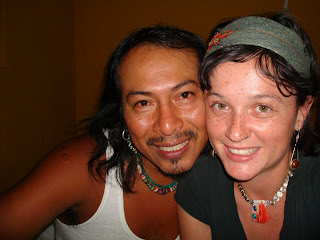
...I've fallen in love with a Peruvian artisan boy and we are selling jewelry on the street and I am never coming home.
Well, that might be a bit of an exaggeration. I am not quite in love, but I like him a lot. And I will still probably come home as scheduled, by this summer. But for now, I have found a great boyfriend, travel buddy, business partner, teacher, and friend. His Quechua name is Atahualpa, after an Incan prince. And how did we meet? Same way I meet all my latino loves: talking about indigenous cultures of course! I was in Mancora in northern Peru over a month ago, and was looking at his jewelry. He was telling me about a shell that was used by the Inca as a form of currency. He said, "It's the same as the way the Maya used-" and I finished the sentence, "cacao beans." The rest is history. We spent a day and a half together, but I was with Serena amd Erin and had to keep moving. We planned to meet up 3 weeks later in Lima to see what happened.
So we met up a couple weeks ago, literally an earth-moving experience. That first night there were 2 earthquakes in Lima, 4.7 and 5.3.
Since then we've settled into a pleasant rhythm in Mancora, the small touristy beach town where we met. On a typical day, I go running on the beach first thing, when it's still pretty cool in the 70's. Then Ata and I go to the market for breakfast, always ceviche and fresh fruit smoothies. I love eating fish in the morning. We buy fresh bread and avocados for later. Then we head to the vendor's row and set up the booth or stall of jewelry, called el parche, or "patch". All the artisans greet each other with "hola, wayky" or "brother" in Quechua. We chat with passersby and he slowly teaches me things about artisanal jewelry making, such as what the stones are or how to make metal chains or clasps by hand, or how to do a wire wrap around a stone. It is really empowering to learn how to make these things, sort of a dream come true. For lunch we always eat at a little stand with an old man Ata calls el papacho, or big father. He gets up at 5 to start cooking and bring all the food in on his cart. It's usually rice, seasoned noodles, a little potato, a slice of sweet potato (sounding like a low carb nightmare so far), chilean beans, pickled onion, and either fritata, chicken, or fried fish for the entree. All this plus a cebada, or homemade barley drink, for 3 sols, or right around a dollar. By then I need a little nap in the hammock, which we hang nearby. Or we ask an artisan friend to watch the parche and we go swimming in the ocean. Did I mention it's like 90 degrees? Top priority is staying in the shade and drinking cold things. By afternoon some one is selling bolas, or homemade fruit popsicles in a little baggie, for 20 centimos, or about 8 cents. I always get coconut. Later I try to finish whatever project I started earlier, maybe a necklace or bracelet. We stay at the parche for as long as there is light or people, which ever comes last.
In the evenings we'll get dinner, use the internet, go for a walk, and hang out with our Argentinian neighbor friends. They are a couple renting the room next to ours. I still don't even know their names, Ata just calls them the Che's since they're from Argentina. I have a really hard time understanding their accent. In the beginning they would talk about going to the plasha, and I was wondering for DAYS why they spent so much time in the plaza. I finally realized they were saying playa, or beach. Despite our communication breakdown, the did teach me how to pour a proper cup of mate. I thought I already knew how, but there is even more to it than I was aware of.
The only break from this lovely routine is when someone convinces Ata to go to the chicha. Chicha is a prehispanic corn drink, or Incan beer. It is only homemade, not sold commercially. The houses that sell it will hang a white flag outside their door. It only ferments for about 3 days, has a really low alcohol content, and tastes like milky kombucha. But it's cheap and an important social ritual. You go in and buy it by the bucket, and they also give you a pitcher for pouring and one bowl to drink out of. One person drinks at a time and then passes the bowl to the next person. When you patron a local place, it is customary for them to give you free food with your purchase, usually a pretty substantial plate of ceviche. Or you can bring your own food- we brough fish, limes, yucca, and sweet potato- and the señora cooks it up for free.


No comments:
Post a Comment